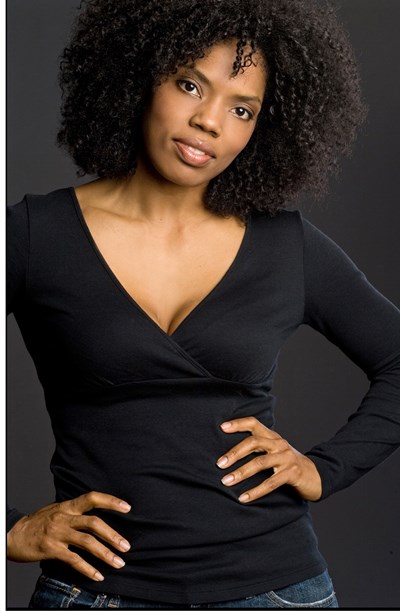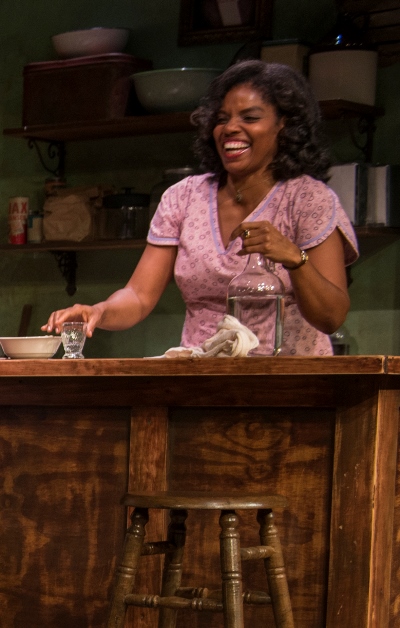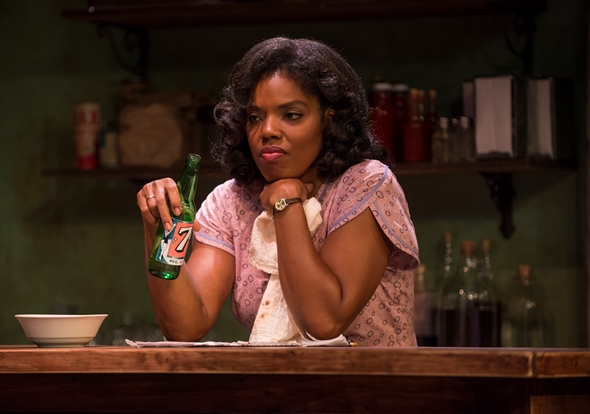Role Playing: Tyla Abercrumbie was set to run little ‘Hot Links’ café, but why was she there?
Interview: Actress says she needed time, nudging from director to understand woman among men in Writers’ “East Texas Hot Links.”
By Lawrence B. Johnson
Actors know the OMG moment well. You win the audition and get the part. Then comes hard reality: You actually have to do it.
But for Tyla Abercrumbie, who gives one of those performances you can’t take your eyes from in Eugene Lee’s “East Texas Hot Links” at Writers Theatre, the daunting truth was not simply that she had to measure up to what she’d won: She had to figure out why her character was even in the play.
 “I’d read it several times and always thought Charlesetta was a beautifully written, wonderful role, but the truth is I didn’t initially know what her purpose was,” says Abercrumbie of the solitary woman who somehow manages to be both on the periphery and at the center of a clutch of men in Lee’s earthy, funny work, which in a final stroke turns stunningly tragic.
“I’d read it several times and always thought Charlesetta was a beautifully written, wonderful role, but the truth is I didn’t initially know what her purpose was,” says Abercrumbie of the solitary woman who somehow manages to be both on the periphery and at the center of a clutch of men in Lee’s earthy, funny work, which in a final stroke turns stunningly tragic.
“Why is she here? Why does she stay? I wondered if you could remove her from the play and still tell the story. Then I started to realize that even though she’s younger than some (of the men) and older than others, they all place some level of faith and trust in her.
“She’s maybe in her late thirties and sees forty on the horizon. Charlesetta’s in this space you’re in when you’re not a child any more. She’s not going anywhere. This is her place and her life. She knows it isn’t the best place to be, but it is what it is. It’s like, I am here. She says, ‘Thank God that highway ain’t gonna cut through these woods’” — and blast away this precious preserve of safe community.
It is East Texas 1955, a perilous time for the black locals. Life is shaped and limited by white men’s oppressive rules, and violators are dealt with severely. This little café, which Charlesetta has inherited from her father, is a humble social club and sanctuary – as Abercrumbie says, the safest place for black people to be, next to the church.
 “The café is like Cheers, that place you go to that is home away from home,” she says. “It’s familiar. You’re comfortable being who you are around people you know well. It feels like family even though there are no blood lines. It’s that piece of the community we all long for.
“The café is like Cheers, that place you go to that is home away from home,” she says. “It’s familiar. You’re comfortable being who you are around people you know well. It feels like family even though there are no blood lines. It’s that piece of the community we all long for.
“Transactions take place there. It serves as a post office. ‘Make sure to hand this off’ — and you know Charlesetta won’t peek into your package or, if it’s cash, take a little off the top. It’s a place she has known since she was a child. And now this is who she is. She owns her own business, she’s her own woman. And probably a spinster. That’s the most powerful thing about Charlesetta to me – she’s not willing to settle and become somebody’s wife or mother.”
Not that she doesn’t get offers. She’s the apple – or maybe better, the peach – of young Roy Moore’s eye, and Roy (played by Kevin Roston, Jr.) makes clear his far-from-Platonic interest daily, and in a broadly public way, to the amusement of the café’s older regulars. Though Charlesetta keeps Roy at bay, says Abercrumbie, she’s not exactly put off by his advances.
 “She wants to look nice, smell nice. She’s that wonderful woman who gives men permission to be themselves. I love that duality about her. She can listen to their raw and gritty talk, but she also knows everyone respects her and there’s a line that can’t be crossed. (Playwright) Eugene Lee creates that unwritten dynamic. Everybody teases each other, but it’s friendly and loving, and they know where to stop.”
“She wants to look nice, smell nice. She’s that wonderful woman who gives men permission to be themselves. I love that duality about her. She can listen to their raw and gritty talk, but she also knows everyone respects her and there’s a line that can’t be crossed. (Playwright) Eugene Lee creates that unwritten dynamic. Everybody teases each other, but it’s friendly and loving, and they know where to stop.”
Assured though she is in Charlesetta’s persona now – indeed, her warmth pervades the show – Abercrumbie admits that getting there involved many a conversation with director Ron OJ Parson.
“In the first rehearsals, I was misinterpreting the aggression in Charlesetta’s character as anger,” she says. “Ron reminded me to always take what the writer gives you, which is that she actually likes all these knuckleheads. She isn’t angry, but a very loving woman who has inherited not just the bar but the legacy as well. Being black in America never has been about job and career, but about survival. When you’re focused on surviving, you don’t stop to calculate what’s my dream, you just keep it going, keep it open. And you count on community.
 “As we got deep into the play, I found myself overwhelmed by how we’re still dealing with so many of the same issues today — how many young mothers lose their children to violence. I became exhausted just thinking about this. How much have we progressed? I want to believe the terrible events of the play are not possible today, but in rehearsal we found ourselves talking about a shooting that had just happened.
“As we got deep into the play, I found myself overwhelmed by how we’re still dealing with so many of the same issues today — how many young mothers lose their children to violence. I became exhausted just thinking about this. How much have we progressed? I want to believe the terrible events of the play are not possible today, but in rehearsal we found ourselves talking about a shooting that had just happened.
“We knew we weren’t dealing with issues that were dead or past or fiction. With our political climate being what it is today, the racial situation is very intense. We must hope for something better, and try to move toward something better, but it isn’t over.”
In “East Texas Hot Links,” it’s an act of community love that simultaneously brings down destruction and engenders hope. Both eventualities center on the youngest character in view, an ambitious and naïve lad called Delmus (Luce Metrius). It was Charlesetta’s connection to this optimistic, impatient youth that provided Abercrumbie with the key to her character.
“It took me a while to realize her motherly instinct toward Delmus,” the actress says. “She admires his hunger and his desire to do something more. She’s the first to speak up for him. Once I found that thread, I began to understand all the other relationships.”
Related Links:
Review of “East Texas Hot Links”: Read it at Chicago On the Aisle
More Role Playing Interviews:
- AnJi White, as Catherine Parr, learned to keep her wits – to keep her head
- Adam Bitterman, unlikely florist in ‘Seedbed,’ dug deep to create a rare bloom
- Danny McCarthy, pushing broom in ‘The Flick,’ finds vital pulse in long silences
- Mierka Girten, actor with MS, knows wound behind her character’s scars
- Sandra Marquez, as Clytemnestra, sees an exceptional woman in the Greek queen
- Brian Parry says he summoned courage before wit as George in ‘Virginia Woolf’
- Tracy Michelle Arnold debunks madness as force that drives Blanche DuBois
- Christopher Donahue, as Ahab, finds sea’s depth in sadness of a vengeful soul
- Lance Baker embodies ennui, despair of fugitive Jews in ‘Diary of Anne Frank’
- Francis Guinan embraces conflict of father who fled from grim truth in ‘The Herd’
- Sophia Menendian reached back (but not far) as plucky Armenian refugee of 15
- Lindsey Gavel’s distressed Masha, in ‘Three Sisters,’ began with a touch of cheer
- Hollis Resnik felt personal bond with zealous, skeptical scholar in ‘Good Book’
- A.C. Smith is ready undertaker, lord of diner world in ‘Two Trains Running’
- Lia D. Mortensen’s intense portrait of a mentally failing scientist holds mirror to life
- Siobhan Redmond sees re-formed Lady Macbeth as valiant queen in ‘Dunsinane’
- Eileen Niccolai harnessed a storm of emotions to create spark in Williams’ Serafina
- Steve Haggard, aiming at reality, strikes raw core of grieving man in ‘Martyr’
- Shannon Cochran found partners aplenty in sardonic, twice-told ‘Dance of Death’
- Natalie West scaled back comedy to nail laughs, touch hearts in ‘Mud Blue Sky’
- Dave Belden, actor and violinist, adjusted pitch for ‘Charles Ives Take Me Home’
- Joseph Wiens starts at full throttle to convey alienation of ‘Look Back in Anger’
- Shane Kenyon touches charm and hurt of lovable loser in Steep’s ‘If There Is’
- Ramón Camín sees working class values in Arthur Miller’s tragic Eddie Carbone
- Hillary Marren’s charming, rapping witch in ‘Woods’ shapred by hard work, free play
- Mary Beth Fisher embraces both hope, despair of social worker in ‘Luna Gale’
- Brad Armacost switched brothers to do blind, boozy character in ‘The Seafarer’
- Karen Woditsch shapes vowels, flings arms to perfect portrait of Julia Child
- Ora Jones had to find her way into Katherine’s frayed world in ‘Henry VIII’
- Kareem Bandealy tapped roots, hit books for form warlord in ‘Blood and Gifts’
- Eva Barr explored two personas of Alzheimer’s victim to find center of ‘Alice’
- Darrell W. Cox sees theater’s core in closed-off teacher of ‘Burning Boy’
- Chaon Cross turned Court stage into a romper room finding answers in ‘Proof’
- Dion Johnstone turned outsider Antony to bloody purpose in ‘Julius Caesar’
- Noir films gave Justine Turner model for shadowy dame in ‘Dreadful Night’
- Anish Jethmalani plumbs agony of good man battling demons in ‘Bengal Tiger’
- Gary Perez channels his Harlem youth as quiet, unflinching Julio in ‘The Hat’
- Kamal Angelo Bolden sharpened dramatic combinations to play ‘The Opponent’
- In wheelchair, Jacqueline Grandt explores paralysis of neglect in ‘Broken Glass’
- James Ridge thrives in cold skin of Shakespeare’s smiling serpent, Richard III
- Stephen Ouimette brews an Irish tippler with a glassful of illusions in ‘Iceman’
- Ian Barford revels in the wiliness of an ambivalent rebel in Doctorow’s ‘March’
- Chuck Spencer flashes a badge of moral courage in Arthur Miller’s ‘The Price’
- Rebecca Finnegan finds lyrical heart of a lonely woman in ‘A Catered Affair’
- Bill Norris pulled the seedy bum in ‘The Caretaker” from a place within himself
- Diane D’Aquila creates a twice regal portrait as lover and monarch in ‘Elizabeth Rex’
- Dean Evans, in clown costume, enters the darkness of ‘Burning Bluebeard’
- Dan Waller wields a personal brush as uneasy genius of ‘Pitmen Painters’
- City boy Michael Stegall ropes wild cowboy in Raven Theatre’s ‘Bus Stop‘
- Brent Barrett is glad he joined ‘Follies’ as that womanizing, empty cad Ben
- Sadieh Rifai zips among seven characters in one-woman “Amish Project”
- Kirsten Fitzgerald inhabits sorrow, surfs the laughs in ‘Clybourne Park’
- Janet Ulrich Brooks portrays a Russian arms negotiator in ‘A Walk in the Woods’
Tags: East Texas Hot Links, Eugene Lee, Kevin Roston Jr., Luce Metrius, Ron OJ Parson, Tyla Abercrumbie, Writers' Theatre



1 Pingbacks »